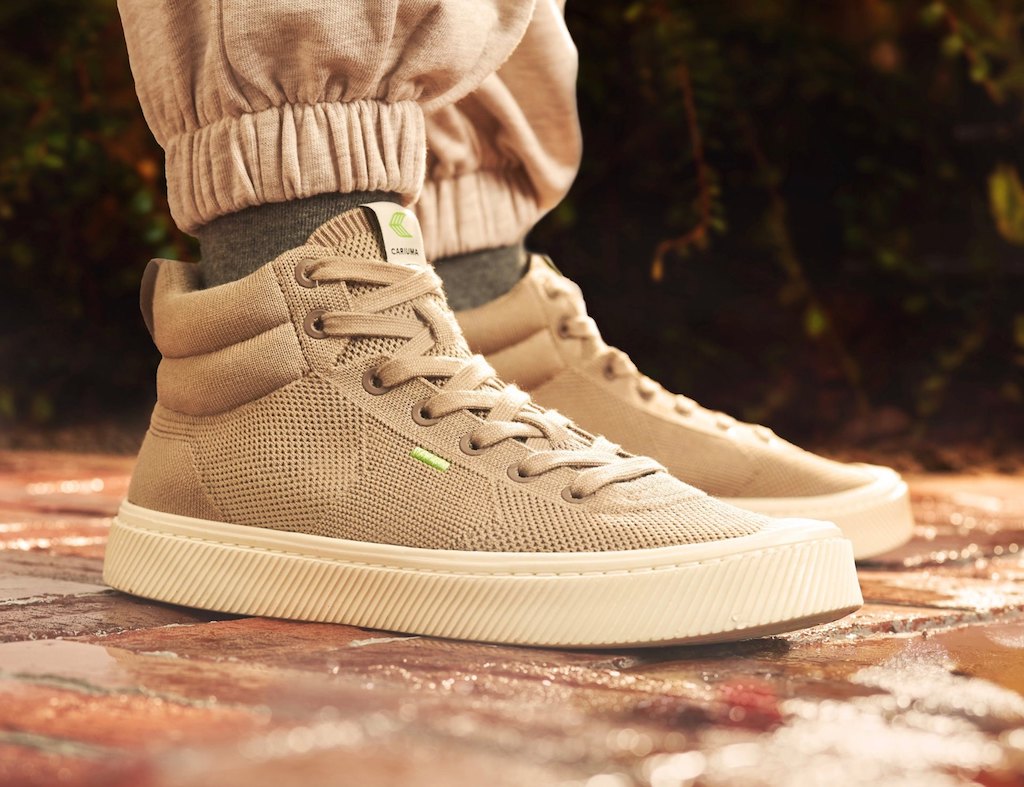3 Mins Read
Brazilian eco sneaker brand Cariuma has added a brand new sneaker to its sustainable shoe line-up. Called the IBI High, the new shoes are vegan-friendly, carbon-neutral and features a water repellent upper. As with the brand’s environmentally-friendly philosophy, the shoes are also designed to be long-lasting in terms of both physical durability and style to ensure that its lifespan can be extended as long as possible.
Founded in 2018 by David Python and Fernando Porto, Cariuma is a Rio-based sustainable sneaker brand that specialises in shoes that are stylish, comfortable and also good for the planet. Their newest sneaker – the IBI High – which is their second edition of their original IBI shoe, is featherweight, carbon-neutral and vegan-friendly. The animal-free shoe launched last week on October 20 and is retailing for US$129.
It is made from bamboo knit spun from plant-based and recycled plastic materials and features a two-piece knitted upper construction with an eco-friendly water-repellent layer that is certified by Intertek as PFC-free, unlike conventional waterproofing coatings that take hundreds of years of biodegrade in the environment. Because of its two-piece feature, the IBI High leaves behind no textile waste after production, and minimal stitching has enabled the brand to keep its energy and waste down.

Read: A complete guide to natural vegan leather alternatives
It’s always challenging to launch new products – especially the ones with a big commitment to sustainability and performance like our IBI line. But I think the world is actually eager for products like this, now during Covid, more than ever.
Fernando Porto, Co-Founder & Chief Creative Officer of Cariuma
Even the outsole is renewable, made entirely from sugarcane, as well as its laces and logo labels that are made from the threads of recycled plastics. Taking almost 15 months to develop in total, the boot-cut shaped design and vegan bio-foam insole – lined with recyclable cork and organic mamona oil – also means optimised comfort and functional stability for foot and ankle support.
Speaking to Green Queen about launching their new shoe despite the coronavirus crisis, co-founder and chief creative officer Porto said: “It’s always challenging to launch new products – especially the ones with a big commitment to sustainability and performance like our IBI line. But I think the world is actually eager for products like this, now during Covid, more than ever.”

As a part of the brand’s commitment to environmental responsibility, Cariuma says that as with every pair of their sneakers sold, they plant a pair of trees in the Brazilian rainforest. As of last month, the company says they have already planted 200,000 trees. Every delivery the company ships out is also carbon neutral thanks to the company’s offsetting measures, and uses recycled packaging that is 100% recyclable too.
Eco footwear has become a hot trend in the fashion industry in recent years, especially as consumers grow conscious of the environmental impact of their kicks. Even mainstream brands have gotten on board, with the likes of Adidas, Reebok and Nike both churning out their own plant-based, vegan-friendly and recycled designs in the past few months.
There are a number of independent boutique brands, who like Cariuma are dedicated to sustainable sneakers too that have emerged, such as Kengos, who makes biodegradable vegan shoes that contain 98% plant-based materials, and Pangaia, a material science startup that recently launched a zero-waste grape leather vegan sneaker.
All images courtesy of Cariuma.




